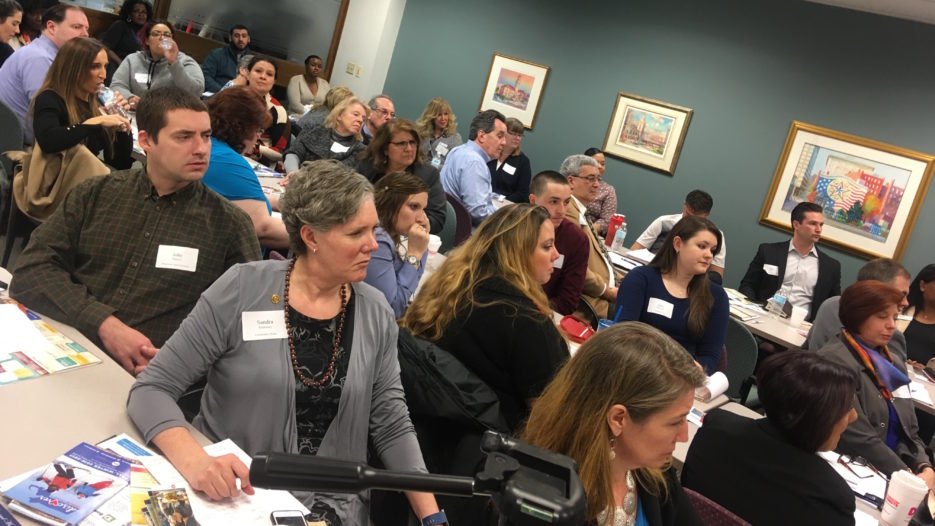Panelist Video Clips
Below are a collection of short videos featuring all the main points presented.
Jamie Adams - Know Your Customer
Jamie Adams - One to say yes, two to say no
Jamie Adams - Take Responsibility for Customer Experience
Jessica Bettencourt, Klem's
Jessica Bettencourt - Empowering Your Team
Jessica Bettencourt - Internal Customer Service Benchmarks
Jessie Bettencourt - Using Tech Apps For Products
Michael Covino, Niche Hospitality & Entertainment
Michael Covino - Building Employee Relations
Michael Covino - Dealing With the Unexpected
Michael Covino - Developing Standards
Q&As/Opening and Closing Remarks

All Panelists - Developing a Culture for Customer Service
Q&A - Making a connection with customers
Closing Remarks - Moderator Michael Flippin
Panel Shares Expert Tips
Worcester, MA - The most recent installment of the Worcester Regional Chamber of Commerce’s Seminar Series offers keen insight into how the development of a customer service culture serves as a powerful tool for establishing consumer loyalty.
“If you don’t take care of your customers, somebody else is going to take care of them for you,” says Michael Flippin, chief training officer for Sandler Training/SaleFish LLC, who also was seminar moderator. “Your best customer is someone else’s best potential customer.”
Alongside Flippin was a table of panelists from different industries, including Jamie Adams, regional market manager of TD Bank in the Worcester Region, Michael Covino, president of Niche Hospitality Group, and Jessica Bettencourt, president of Klem’s.
“I think customer service is where we can differentiate ourselves from competition,” says Bettencourt, adding that being a large independent retailer with a wide variety of products, Klem’s has to provide a high level of service. “It’s really one of the only ways that we can compete. It’s providing customers with what they need and what they don’t even know they need.”
For TD Bank, convenience has been at the forefront of customer service practices. According to Adams, convenience can’t be the only asset that keeps them competing. New technology in the digital age has made banking easier by providing instant results. Adams points out that this has caused a change in the need to physically go to the bank. He defines customer service in the financial industry as providing trusted advice. “The highest form of flattery for us is when someone can recommend us to somebody else. I would say as a personal banker, the highest form of flattery for me is when a customer won’t make a decision in their financial life without consulting with me first,” says Adams.
Covino mirrors this by emphasizing that the customer’s experience should be a memorable one. “People make decisions based on emotion,” he says.
In a successful customer service culture, the internal relationships are just as important as the external. This means that the interaction between employer and employee should be treated the same as an interaction with the customer. “We call it a culture of hospitality…You can’t have external hospitality if you don’t have internal,” says Covino. “Most of our pearls of hospitality are around internal hospitality…Everyone is always talking about giving 100 percent...we call it 51 percent...A ‘51 percenter’ at work means that they’re 51 percent emotional and 49 percent technical. It means that what they’re doing, they’re doing because they love it slightly more than their actual ability to do it.”
Internal customer service practices ensure that employees are motivated and willing to be held responsible for the consumer experience. Adams spoke of using Service Level Agreements as a tool to measure TD Bank’s legendary service. “We have to have this consistent vision painted from the top about what legendary looks like. I think that’s where you start to develop culture, when it’s just relentless and there’s accountability across the board for everyone.”
“Internal customer service is probably one of the most important aspects,” adds Bettencourt, mentioning that her immediate customers are her employees. “It’s not about selling; it’s really about solving whatever issues they come in with.” She also believes that internal service relies on each person doing their job.
Elaborating on this, Flippin asked the panelists to explain what they do to empower their team members.
Addressing the advancement of technology, Bettencourt explains how keeping employees off their phones is a losing battle. However, due to the use of a phone app, Klem’s has been able to scan products and expedite potential issues by providing the customer with immediate results. “We empower them [employees] to be able to have their phone, but be able to use it to provide service.”
Adding to this, Adams says, “We empower everyone up to our front line employees to be able to say yes.” When measuring standards, Adams feels it’s vital to understand everyone’s role. “Teach your job to the person below you and learn the job of the person above you. That really permeates throughout our culture.”
He also adds that when employees approach him with questions, he prefers to ask for their recommendation instead of answering it for them. Doing this empowers employees to make future decisions on their own as well as reinforcing the customer service culture.
When developing a customer service culture, panelists feel it’s important to focus on both the internal and external factors. From establishing respect and accountability within the company to going above and beyond for consumers, a strong customer service culture will make any business a viable competitor.
“In the end, we are all consumers, and we expect a certain level of responsibility to be taken for our experience. “As consumers, we want to be heard,” Adams said.
~ Zaven Donoian








